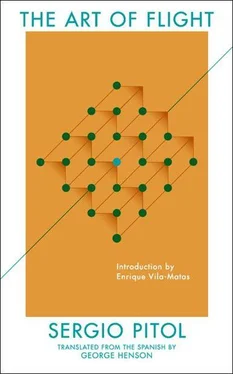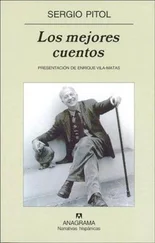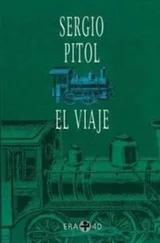Thirty-five years have passed since the death of our Ulysses. By the end of his life, he was a mere shadow of himself. There remains little trace of his philosophical thought; his battles, his fury, his contradictions, and his unpredictable changes of allegiances have ceased to stir passions. Of him there remains, above all, a testament of insubordination. The example of an individuality that refused to submit to any rule imposed from without. There remains the splendid faith of an apostle who saw salvation in the spirit and who turned the book into his favorite instrument. There remains the splendor of his prose, which illuminates all of Creole Ulysses and many other fragments in the other memoirs. There remains the image of a man who, wanting to save everything, becomes lost completely. There remains the memory of his redemptive power. And for all this, in a world where submission is the rule, we will never be able to thank him enough.
Xalapa, July 1994

28 Translated by William and Charles Archer
Writing about Antonio Tabucchi has always placed me on the threshold of the impossible. Dazzled by his writing, my greatest temptation is to reproduce it abundantly, to fill pages with his quotations, find a common thread, and deploy them in an order best for sharing with the reader the pleasure of reading him. His prose is hard to imitate; it possesses its own melody, an emotional tension moderated by intelligence. His writing is conjectural and at the same time precise. In his novel Requiem: A Hallucination , a ghostly Pessoa pleads with the narrator: “ Please , don’t abandon me to all these people who are so certain about everything, they’re dreadful.” 29
Misunderstandings, ambiguities, grey areas, false evidence, imagined realities, and dreams mottled by a terrible reality, the search for what we already know is lost, backward games, voices from the gates of hell — these are elements that we often find in Antonio Tabucchi’s world. Another one: a perfect elegance born of simplicity. Tabucchi’s elegance is like melancholy, always clinging to the shadow of the story, or buried in the subsoil of language.
Tabucchi declares that he aspires to write for a reader who expects neither solutions nor words of consolation but rather questions. The presumed reader should be willing to be visited, to host the imponderable, to modify mental categories, lifestyles, to introduce new ways of approaching the human condition: to force destiny rather than be condemned to an early requiem.
In a lecture delivered in Tenerife in 1991, entitled “The Twentieth Century, Balance and Perspectives,” Tabucchi asserts: “A writer who knows everything, who is already familiar with everything should not publish a book. The only certainty that I have is that everything is relative, that there is another side to everything. It is, above all, this area where I like to investigate, where nothing is immediately visible.” And later: “The man given to us by the literature of our time is a solitary and broken man, a man who is alone but no longer knows himself and has become unrecognizable […] One must reclaim the right to dream. This may seem, at first, like an insignificant right. But, upon further reflection, it will seem like a great prerogative. The man who is still able to nourish illusions is a free man.”
And that brings us to Pereira and what he declares in the novel that bears his name. Tabucchi takes risks that few authors are willing to take. Pereira Declares is, among other things, a political novel, which in itself will cause some to furrow their brow. It narrates events that occurred in Lisbon during the span of a month, between late July to late August 1938, a period during which the Salazar regime strengthens its totalitarianism and locks Portugal away in a seamless dictatorship that will last thirty-five cruel years. It is, indeed, a political novel, but different in every way from the ideological narrative of socialist realism. The only thing that Tabucchi’s novel shares with stories of an ideological character is its parabolic nature. And this is perhaps the source of its greatest challenge. Every character that participates in an apologue exemplifies a virtue or a vice that will ultimately be unmasked and punished or rewarded; all of their words and actions are predetermined in general terms to achieve this purpose. However, in order to be novelistically valid, it must have its own breath, assume those virtues or defects as an individual expression, otherwise the language will always give off a whiff of pamphleteering.
Pereira, the protagonist of Tabucchi’s novel, like Ariel from The Tempest , is built of “such stuff as dreams are made on.” However, as he fulfills his destiny he becomes imbued with reality, a tragic reality. In the end, we find him transformed into an extraordinarily animated character, one of the most lovable of contemporary narrative. He enjoys the double privilege of maintaining his individuality and of becoming a symbol.
Who, then, is Pereira, what does he do, what problems does he face? Well, he is an old journalist, an infernally fat widower, plagued with ailments, whom doctors have given only a few years to live. Not long ago, he began to edit the weekly literary page of a second-rate evening paper. He becomes obsessed, almost maniacally, with obituaries. Several things could explain this phenomenon, perhaps because his father was the owner of a funeral home called La Dolorosa, or that his wife suffered from tuberculosis during their entire marriage, to which she eventually succumbed, or the conviction that his heart problems would lead him to an early grave. But, too, because during the radiant summer of 1938, he began to sense that Lisbon reeked of death, that all of Europe reeked of death. Pereira is Catholic. The immortality of the soul and the resurrection of the flesh are topics on which he meditates incessantly. The first illuminates him; the second terrifies him. Imagining that the vast quantity of fat that smothers him will be resurrected makes him dizzy. Pereira, plain and simple, is a good man, immersed in a world that he finds increasingly more disgusting. His cult of death leads him to create an obituary column for the literary page he edits, to prepare in advance the obituaries of writers whom he admires; but, for some reason, he refuses to be the one to write them. To this end, he contacts a young man, who has recently graduated university, from the Faculty of Philosophy, Francisco Monteiro Rossi, whose essay precisely on the subject of death he has just read.
Pereira Declares at times sends me to one of the author’s earlier novels, which I revere: The Edge of the Horizon . At first glance they might seem like opposites. An old Pereira moves under Lisbon’s radiant blue sky. Spino, the protagonist of The Edge of the Horizon , on the other hand, carries out his investigations under a hazy sky in a city steeped in humidity and darkness. Pereira’s search ends with the discovery of personal freedom, the performance of an act of protest, which at the time disguises a heroic quality: by revealing himself he discovers the society that surrounds him. Spino, however, isolates himself little by little from society as if trying to suppress a metaphysical sign. How, then, are these stories alike? On the one hand, the theme of death is always present in both. Pereira imagines a collection of obituaries at the service of his cultural page. Death and eventual resurrection are his obsessions. Spino works in a hospital morgue, he is in constant contact with corpses. In both novels, personal identity is the underlying theme. In both, the result is the same: each of the characters marches toward the revelation of a destiny that is incubating inside him.
Читать дальше













